 Politics & Law
Politics & Law

Nhật Hồng
Throughout Việt Nam’s modern history, diplomacy has been a strategic pillar – essential not only for safeguarding national independence and driving development, but also for advancing international integration.
Over the past 80 years since the nation’s independence in 1945, Việt Nam’s foreign policy has remained consistent in principle while flexible in approach, adapting to shifting global realities, national priorities, and strengthening the country’s standing on the international stage.
From an isolated, embargoed nation, Việt Nam has transformed into an active, responsible member of the global community, guided by a foreign policy of diversification and multilateralisation of relations.
Today, it maintains diplomatic relations with 194 countries, including nearly 40 strategic and comprehensive partnerships with all five permanent members of the United Nations Security Council, the G7 and most G20 nations. Việt Nam also plays an active role in more than 70 international and regional organisations.
These achievements are the result of generations of Vietnamese leadership, beginning in 1945 when President Hồ Chí Minh assumed the post of Minister of Foreign Affairs in the Provisional Government.
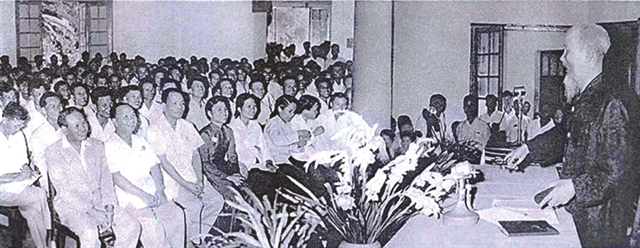 |
| President Hồ Chí Minh addresses the first Diplomatic Conference of Việt Nam in March 1957. — Photo courtesy of the Commission for Information and Education |
Nguyễn Dy Niên, who served as Vietnamese foreign minister between 2000-2006, said the decision underscored the critical role of diplomacy in confronting the challenges facing the country at the time.
At the end of World War II, Việt Nam faced the presence of multiple foreign forces. Guided by his vision of independence, President Hồ's diplomatic efforts led to the successful signing of the Accord between France and the Democratic Republic of Việt Nam on March 6, 1946, which set conditions for the recognition of Việt Nam as a free state and for the withdrawal of foreign troops.
A temporary agreement followed on September 14 of the same year, buying the young republic valuable time to prepare for the long resistance.
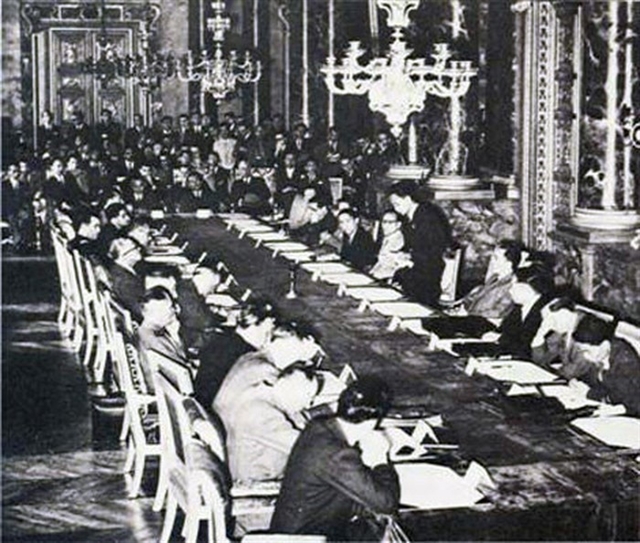 |
| The Vietnamese delegation during negotiations with the French at the Fontainebleau Conference, which took place in July-September 1946. — VNA/VNS File Photo |
Leveraging victories on the battlefield at the negotiation table, Việt Nam’s diplomatic corps went on to secure historic milestones – the 1954 Geneva Accords and the 1973 Paris Agreement – paving the way for national reunification on April 30, 1975.
President Hồ’s vision – to understand the world, learn from adversaries and rally support at home and abroad – has continued to shape Việt Nam’s diplomacy in both war and peace.
Modern era
Tôn Nữ Thị Ninh, a former diplomat who served as the Vietnamese ambassador to the EU and on the National Assembly’s foreign affairs committee, said the country’s economic rise since the 1980s has given the country a stronger position internationally.
This, she noted, has enabled Việt Nam to pursue a proactive and flexible foreign policy amid complex and unpredictable developments in geopolitical dynamics.
Overcoming post-war embargoes and joining the World Trade Organisation were key milestones, but Việt Nam’s accession to ASEAN was particularly strategic, said Ninh.
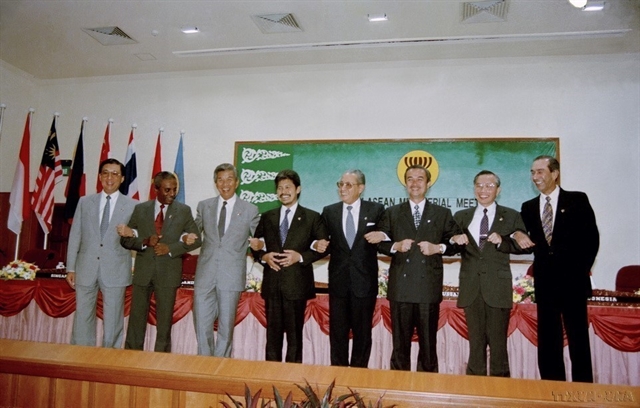 |
| Minister of Foreign Affairs Nguyễn Mạnh Cầm (second from right) with the ASEAN Secretary-General and foreign ministers as Việt Nam became the seventh member of the bloc in Brunei in 1995. — VNA/VNS Photo Trần Sơn |
“Today, ASEAN has built strong trade and economic links with major powers such as the US and China, while carving out a central role across Southeast and Northeast Asia through balance and flexibility within the Indo-Pacific framework,” she explained.
Việt Nam advances global integration not only through active participation in international forums and peacekeeping missions, but also by proactively putting forward initiatives. One example is the expansion of the ASEAN Defence Ministers Meeting to include the bloc’s dialogue partners – Australia, China, India, Japan, New Zealand, the Republic of Korea, Russia and the US.
The country has twice been elected a non-permanent member of the United Nations Security Council, most recently for 2020–2021 with near-unanimous support, receiving 192 out of 193 votes.
Economic diplomacy has become a top priority, driving sustainable growth and global integration. Việt Nam has signed 17 free trade agreements, ranks among the world’s top 32 economies by GDP, and ranks among the top 20 in both trade volume and FDI attraction.
Future outlook
Việt Nam’s diplomatic success has been built on coordination across multiple fronts – from the Party, Government and National Assembly to people-to-people exchanges – covering politics, economy, culture, defence and security.
Ahead of National Day on September 2, Deputy Prime Minister and Minister of Foreign Affairs Bùi Thanh Sơn said "this is a time of historic transformation".
“This is also a strategically important period for the Vietnamese revolution to enter a new era and achieve the centennial goals under the leadership of the Party, laying a solid foundation for the 100th anniversary of national independence,” Sơn said.
In this context, international integration has been defined as not only an essential and continuous mission, but also a vital engine to accelerate Việt Nam’s growth.
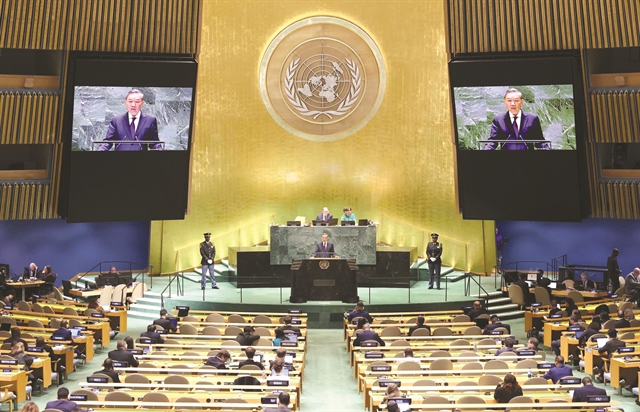 |
| Party General Secretary and State President Tô Lâm delivers a speech at the 79th session of the UN General Assembly in New York in September 2024. — VNA/VNS Photo Lâm Khánh |
Today, international integration for Việt Nam has been defined as actively creating, shaping and helping to lead collaborative mechanisms in accordance with the country’s current conditions and capabilities, said Sơn.
Embodying the nation’s traditions of resilience, courage and adaptability, Việt Nam’s diplomacy places national interests and its people at the core, while also making active and responsible contributions to global peace, prosperity and human progress.
The deputy PM and foreign minister wrote: “Constant efforts are required so that diplomacy remains a link between national interests with the current global context, a firm pillar for development and a shining example of courage and dedication.”
With its remarkable achievements in the cause of nation building and safeguarding, the diplomatic sector has been recognised twice by the State with a Gold Star Order, the Hồ Chí Minh Order once and, most recently, a First-Class Labour Order.
Conferring the recognition to the Ministry of Foreign Affairs at a ceremony in Hà Nội on August 25, Party General Secretary Tô Lâm said "Việt Nam’s diplomacy is now facing a historic mission".
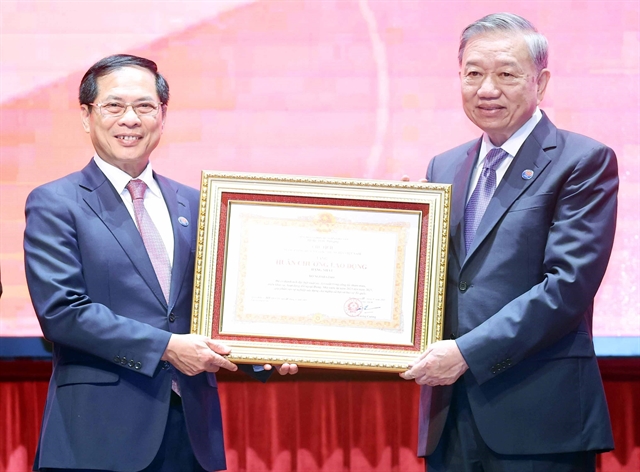 |
| Party General Secretary Tô Lâm presents the First-Class Labour Order to Deputy Prime Minister and Minister of Foreign Affairs Bùi Thanh Sơn, who receives the award on behalf of the Ministry of Foreign Affairs in recognition of its outstanding contributions to the nation. — VNA/VNS Photo Thống Nhất |
The sector must take charge to ensure better conditions for the country’s major breakthroughs, particularly the two centennial goals of becoming an upper-middle-income country by 2030 and a high-income nation by 2045.
Aligning with this direction, Việt Nam’s diplomatic sector has been tasked with safeguarding national interests while staying grounded in the UN Charter and international law.
“Today, as we stand on the international stage with a new stature, we can take pride in the fact that Vietnamese diplomacy not only serves the homeland and the people, but also helps kindle hope for a world of peace, cooperation and development,” said the Party chief.
“Vietnamese diplomacy – with the courage, wisdom, resilience and values of the Vietnamese people – will continue to serve as a core force in fulfilling the noble tasks of establishing and safeguarding a peaceful, stable environment, spearheading cooperation and connectivity and ceaselessly elevating the country’s international standing.” — VNS